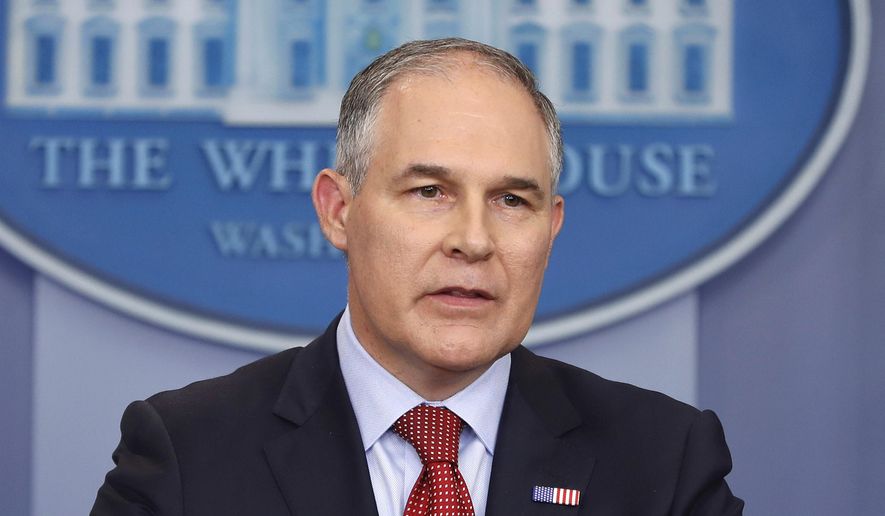Having already dismantled a number of key Obama-era environmental regulations, the Trump administration on Monday took direct aim at one of the most controversial methods used to enact many of those rules: the legal loophole known as “sue and settle.”
In a directive to his department, Environmental Protection Agency Administrator Scott Pruitt said he intends to put a stop to the practice, arguing it has “harmed the American public” and kept citizens in the dark about exactly how rules and regulations are made.
“The days of regulation through litigation are over,” Mr. Pruitt said. “We will no longer go behind closed doors and use consent decrees and settlement agreements to resolve lawsuits filed against the agency by special interest groups where doing so would circumvent the regulatory process set forth by Congress. Additionally, gone are the days of routinely paying tens of thousands of dollars in attorney’s fees to these groups with which we swiftly settle.”
Sue and settle, which became commonplace during President Barack Obama’s tenure as his EPA developed tight-knit relationships with top environmental groups, essentially is a way to circumvent the formal rulemaking procedures. Not surprisingly, green organizations on Monday blasted Mr. Pruitt’s move and cast it as a method of avoiding compliance with environmental law.
Under the practice, sometimes called “friendly lawsuits,” an outside group would sue a department or agency — in this case, the EPA — and ask that certain regulatory steps be taken or that entirely new regulations be put in place. The suits usually were filed under the guise of the EPA not fulfilling its legal obligations under the Clean Air Act, Clean Water Act or other major aspects of environmental law.
Often the agency would agree to settle the case outside of court, and the settlement agreement would provide a legal avenue for the EPA to simply enact the changes the outside organization sought without having to go through the traditional rulemaking process, which requires public comment, draft proposals and a host of other steps designed to keep the public informed.
Numerous Obama-era environmental policies were initially put in place as a result of sue and settle. They include clean air standards for utilities; regional haze rules; Chesapeake Bay Clean Water Act rules; and many others related to air quality and energy exploration, according to a list released last month by the U.S. Chamber of Commerce.
Republican lawmakers praised the move and said that, as time goes by, it will prove to be a victory for transparency.
“The Environmental Protection Agency should not make regulations by settling lawsuits behind closed doors,” said Sen. John Barrasso, Wyoming Republican and chairman of the Senate Environment and Public Works Committee. “Under the last administration, the EPA advanced its political agenda by abusing its authority and leaving states and Congress in the dark. The public deserves to know how its government is operating.”
Environmentalists object not only to Mr. Pruitt’s actions Monday but to the very existence of sue and settle. The Sierra Club referred to the practice as a “myth” and said legal challenges are a perfectly reasonable way of ensuring agencies meet their statutory requirements.
“Scott Pruitt and his polluter cronies continue to perpetrate lies about the law as an excuse for refusing enforcing it — but when it comes to the law, the truth has a way of catching up with you,” said Pat Gallagher, the Sierra Club’s environmental law program director. “The government generally seeks to negotiate settlements precisely because of significant legal vulnerability — and Pruitt’s abuse of the law by delaying, obstructing and blocking numerous public health safeguards means he is extremely vulnerable to being held accountable in court.”
While outside legal prodding can and has been used to compel the government to fulfill its obligations, critics of the sue-and-settle tactic say it was especially damaging when Mr. Obama’s EPA was crafting regulations that would have a direct impact on citizens’ wallets.
“This will greatly improve the transparency to the American people so we can better know what’s happening and provide feedback. It is especially useful when the regulations will harm our economy or the ability of small business owners to compete with big corporations or other entities,” said Ken Cuccinelli, director of the FreedomWorks Foundation’s Regulatory Action Center.
• Ben Wolfgang can be reached at bwolfgang@washingtontimes.com.




Please read our comment policy before commenting.